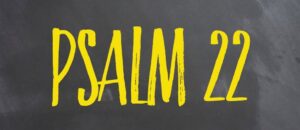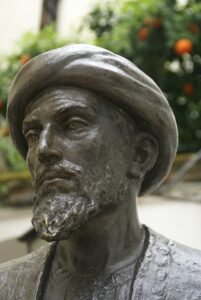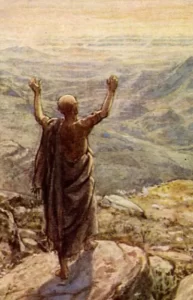Psalms 22 – Catch 22 of a Crucifixion Prophecy
 Psalms 22 is retrospectively viewed by Christians as a foreshadowing or a prophecy consistent with Isaiah’s and Zechariah’s prophecies of a Messiah who is pierced. Some say it is neither, rather a falsehood.[1]
Psalms 22 is retrospectively viewed by Christians as a foreshadowing or a prophecy consistent with Isaiah’s and Zechariah’s prophecies of a Messiah who is pierced. Some say it is neither, rather a falsehood.[1]
Prophecies are challenging due to many factors. Typically not straightforward nor easy to understand, a prophecy is often not fully or clearly understood until a full realization that it did, in fact, occur. In some cases, it may be clarified by other prophecies.[2]
Crucifixion does not need interpretation – Roman crucifixion had developed into a well-honed process by the end of the BC era. It was designed to extend death as long as possible while inflicting maximum pain and humiliation.
To have prophetic qualities, Psalm 22 would need to predict details about a crucifixion that are precise enough to avoid conjecture. Written at a time when the Roman Empire did not yet exist, the Psalm content appears more prophetic because the Roman-style crucifixion was not yet invented.
Jewish historian Josephus described an occasion where he was traveling with the Roman military when they came upon three of his Jewish acquaintances among many others being crucified along the road to Thecoa, not far from Bethlehem.[3] Struck with compassion, he pleaded personally to Titus Caesar to have mercy on them. Titus commanded them to be taken down from their crosses and treated by Roman physicians, but still only one survived.
“I am poured out like water, and all my bones are out of joint. My heart has turned to wax; it has melted away within me. My strength is dried up like a potsherd, and my tongue sticks to the roof of my mouth; you lay me in the dust of death. Dogs have surrounded me; a band of evil men has encircled me, they have pierced my hands and my feet. I can count all my bones; people stare and gloat over me.”[4]
Not quoted by a crucifixion victim known by Josephus, nor was it quoted by any other Roman historians who documented Roman crucifixions. The description was written by King David in Psalms 22 centuries earlier, yet the depiction is wholly consistent with that of a Roman crucifixion victim a millennium later.
Rabbi sages do not considered the Psalms as a book of prophecy; yet renowned Jewish sage Rabbi Rashi twice identified Psalms 22 verses as having futuristic implications involving David and the Messiah.
Rashi commented in the second verse, “David recited this prayer for the future” and later for verse 27, the Rabbi commented “The humble shall eat” meaning “at the time of our redemption in the days of our Messiah.”[5] Psalms 22, at least in part in Rashi’s words, is prophetic.
Raising the bar for prophetic difficulty are the very distinct actions in Psalms 22 – quotes and explicit activities. Since persons other than the victim were involved, they could not be replicated by the victim:
PS 22:7-8 All who see me mock me; they hurl insults, shaking their heads: “He trusts in the LORD; let the LORD rescue him. Let him deliver him, since he delights in him.”(NIV)
PS 22:18 “They divide my clothes among themselves and throw dice for my garments.” (NIV)
Inflicted extreme suffering, specific actions, and spoken words in Psalms 22 are remarkably similar to the Gospel accounts of the crucifixion of Jesus of Nazareth. A montage of Gospel verses reflects those similarities:
JN19:17-18 “Carrying his own cross, he went out to the place of the Skull (which in Aramaic is called Golgotha).” Here they crucified him, and with him two others—one on each side and Jesus in the middle.
MT 27:36 “And sitting down, they kept watch over him there.”
MK15:24 “Dividing up his clothes, they cast lots to see what each would get.”
LK 23:35-36 “The people stood watching, and the rulers even sneered at him. They said, “He saved others; let him save himself if he is the Christ of God, the Chosen One. The soldiers also came up and mocked him.” (NIV)
A second quote, “My God, my God, why have you forsaken me?” opens the first verse of Psalms 22. These words were also uttered by Jesus when he was dying on the cross:
Ps 22:1 “My God, my God, why have you forsaken me?” (NIV)
MT 27:45-46, MK 15:33-34 “Now from the sixth hour until the ninth hour there was darkness over all the land. And about the ninth hour Jesus cried out with a loud voice, saying, ‘Eli, Eli, lama sabachthani?” that is, “My God, My God, why have You forsaken Me?’”(NIV)
Answers to two questions are in play: is Jesus the Messiah and is Psalms 22 prophetic?
By the time Jesus uttered these words, he had already endured severe flogging, exposed raw flesh, severe blood loss, acute dehydration, exposure to the weather, hanging by nails from the cross, labored and painful breathing and in state of shock. In his excruciating misery and naked humiliation, he would have seen and heard the gawking and sneering crowd with their taunts and insults.
Jesus would have to know in advance – before his arrest, trial, and crucifixion with the most unlikely collusion between the Jews and their hated Roman enemies – this opportunity would present itself in order to perpetrate a Messiah fraud by quoting from Psalms 22. No fraudster could know of this opportunity in advance, meaning having this advance knowledge would be supernatural.
Establishing a false Messiah image would have been fully dependent upon Psalms 22 being prophetic or else a false Messiah could not sell the fraud. Said another way, if the entirety of Psalms 22 was not prophetic, then quoting from it by the Messiah would be a pointless coincidence.
Catch 22
Apply the Doctrine of Chances to Psalms 22 containing at least five precise details that had to be met if the Psalm were to be a 100% fulfilled prophecy. All came to pass during the crucifixion of Jesus, according to the Gospels, making Psalms 22 prophetic.
What are the odds Psalms 22 is a Messiah prophecy fulfilled by the crucifixion of Jesus?
Updated June 21, 2024.
This work is licensed under a Creative Commons Attribution-NonCommercial-NoDerivatives 4.0 International License.
REFERENCES:
[1] Green, James. Psalm 22: Is it a Prophecy about Christ?” CultoftheLivingGod. n.d.<http://www.cultofthelivinggod.net/islam/Psalm%2022%20-Prophecy%20about%20Christ.htm> Berkovitz, Abraham J. The Torah. ““My God, My God, Why Have You Forsaken Me?” — Jesus or Esther?” 2022. <https://www.thetorah.com/article/my-god-my-god-why-have-you-forsaken-me-jesus-or-esther>
[2] Bugg, Michael. “Types of Prophecy and Prophetic Types.” Hebrew Root. n.d. <http://www.hebrewroot.com/Articles/prophetic_types.htm> Brooks, Carol. “Prophecy.” InPlainSite.org. <http://www.inplainsite.org/html/old_testament_prophecy.html> “Plaster Miodu. Psalm 22: Na krańce ciemności.” (translated: “Honeycomb. Psalm 22: To the ends of darkness.”) YouTube. image. 2015. <https://i.ytimg.com/vi/rUjYzzjEHfw/maxresdefault.jpg>
[3] Josephus, Flavius. The Life of Flavius Josephus. #75. The Complete Works of Josephus. 1850. http://books.google.com/books?id=e0dAAAAAMAAJ&printsec=frontcover&source=gbs_ge_summary_r&cad=0#v=onepage&q&f=false> “Thecoa.” Bible History Online. 2017. <http://www.bible-history.com/geography/ancient-israel/thecoa.html>
[4] Psalms 22:14-17. NIV.
[5] The Complete Jewish Bible – with Rashi Commentary. Online English translation of the Tanakh (Jewish Bible) with Rashi’s commentary. n.d. <https://www.chabad.org/library/bible_cdo/aid/16243/showrashi/true


 Upon arriving King Balak, who was irritated with Balaam, questioned why the prophet had resisted royal requests to come see him. Brushing off the question and getting right to the point, Balaam said,
Upon arriving King Balak, who was irritated with Balaam, questioned why the prophet had resisted royal requests to come see him. Brushing off the question and getting right to the point, Balaam said,